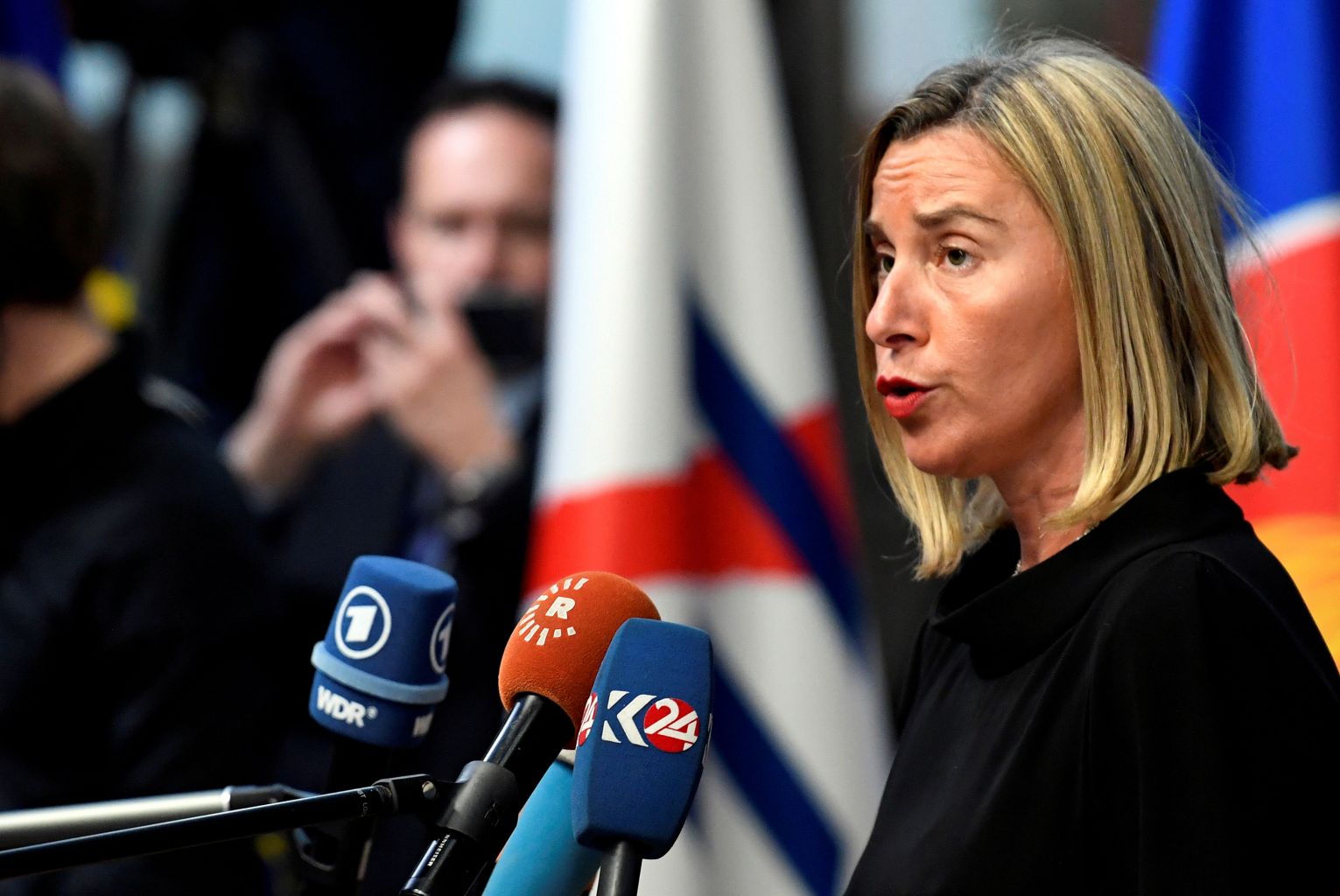Europe appears to buckle under US sanctions on Iran
Sign up now: Get ST's newsletters delivered to your inbox

European Union foreign policy chief Federica Mogherini in Brussels on Oct 18, 2018. She vowed to maintain "effective financial channels with Iran" to ensure Iran's export of oil and gas continues.
PHOTO: REUTERS
The United States Administration appears to have successfully sidelined European opposition to the imposition of sanctions on Iran.
Most European officials have privately admitted that they can do almost nothing to shield the Iranian economy from the comprehensive sanctions which the US imposed at the start of this week despite the joint statement by the governments of Britain, Germany and France as well as European Union foreign policy chief Federica Mogherini vowing to maintain "effective financial channels with Iran" to ensure "the continuation of Iran's export of oil and gas."
The sanctions follow US President Donald Trump's decision in May to withdraw from the 2015 Iran nuclear deal, which in itself ended nearly four years of tough sanctions against Teheran's nuclear development programme. The three major European countries as well as China and Russia who are co-signatories and guarantors of the 2015 Iran nuclear deal continue to back it. and refuse to adhere to the US sanctions.
However, the EU has gone further in announcing that it would not only protect its trade with Iran, but also introduce legislation to punish EU-based companies which bow to US pressure to stop trading with Iran.
The EU also announced that it is setting up a "special purpose vehicle", a financial arrangement which would "allow European companies to trade with Iran in accordance with EU law and could be open to other partners in the world", as Ms Mogherini told the United Nations General Assembly in September.
Russia, which is at the receiving end of separate sanctions and therefore has a broader interest in blunting the US effort, was delighted with the European stance; "Everything that Ms Mogherini has said is extremely positive", said Mr Vladimir Yermakov, who heads the department for arms control in the Russian foreign ministry, when first presented with the EU plans.
But Europe's diplomatic bravado did not survive first contact with reality. Legislation barring EU companies from adhering to US sanctions was duly introduced. However, it was based on European regulations first drafted decades previously, and never tested in the courts.
And, far from protecting EU trade with Iran, it actually hastened the flight of European companies, all eager to avoid having to explain to European regulators why they are suddenly leaving Iran. France's Total energy giant, Danish shipper Maersk, and German insurer Allianz - to name but a few big traders - have all "suspended" their operations in Iran.
Most of these companies cited allegedly purely business-related reasons for ceasing trade. In reality, none of these companies found it worthwhile to risk the huge American fines applied to those trading with Iran, regardless of the legal protection EU regulations may offer.
Meanwhile, Europe's special purpose vehicle not only remains incomplete, but is still in search of a home, for not one of the EU member-states is willing to host such a financial entity, and risk the wrath of the United States.
The US made the introduction of sanctions easier by issuing exemptions on Monday for a number of nations which are big importers of Iranian oil, such as China, India, Japan, South Korea and Taiwan, as well as for Italy and Greece, two EU member-states.
But the sanctions are only for a limited period, and are contingent on countries undertaking to progressively eliminate Iranian purchases from their oil supply chain. So, by offering temporary exemptions, the US has gained influence over the future trade deals of some EU member-states with Iran, precisely what leaders of the European Union sought to avoid.
Meanwhile, the Brussels-based messaging system 'SWIFT' which is used by most of the world's banks to transfer payments duly fell in line with the US sanctions on Monday by suspending Iranian banks from its activities. US officials could hardly hide their satisfaction; "European companies have already made their decisions" said Mr Mike Pompeo, the US Secretary of State.
Mr Richard Nephew, the senior US official who helped design the previous anti-Iran sanctions in the Obama administration, warns that these are early days in the tussle between Europe and the US over the current sanctions. The fact that the Europeans won't cooperate with the US this time means that "Europe will not help the United States police its nationals in their business with Iran", and the US "will be left with few tools to stop them", he warns in an analysis paper published this week.
Perhaps. But, at least for the moment, it's the Europeans who are having a credibility problem; they promised to uphold the nuclear treaty by protecting Iranian trade with Europe, and have failed to deliver.


